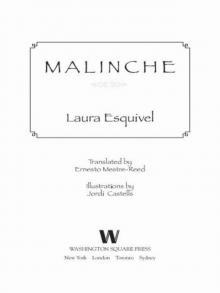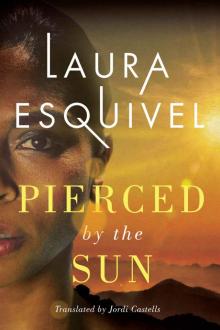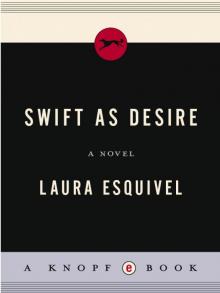- Home
- Laura Esquivel
Malinche Page 11
Malinche Read online
Page 11
Montezuma then took Cortés’s arm and in procession, followed by his brother Cuitláhuac and the lords Cacama of Tezcoco; Tetlepanquetzal, the prince of Tlacopan, Itzcuauhtzin of Tlatelolco, and others, headed for Tenochtitlán.
Tenochtitlán was a city whose expanse was double that of any city in Spain. On seeing it, Cortés did not know what to say. He had never seen a city like it, constructed in the middle of a lake and surrounded by wide canals through which hundreds of canoes glided.
Cortés was dazzled by the mirrors of water. He was impressed by the simple and majestic vision of an architecture that seemed to have been designed in the stars, an architecture that at the same time moved him and awoke in him anger over not having had the talent to imagine it. The contemplation of the great buildings moved all of them, beckoned them to give themselves to the city, to embrace it. But at the same time, the envy that rose in them made them want to reject the city, vaporize it, volatilize it, erase it. In them, a struggle between reverence and scorn was set loose. The more they made themselves at home in Tenochtitlán, the more their admiration and anger grew. The Mexica architecture, aside from making obvious the degree of development of this great civilization, stirred in them devotion, astonishment, respect, for its buildings possessed great harmony and magnificence.
Cortés and his people were housed in the Palace of Axayácatl, the former governor, and father to Montezuma. It was a one-story rectangular building, with many inner courtyards and gardens. Some of them housed wild beasts and exotic plants, and there were aviaries where Montezuma liked to hunt birds with his blowgun. It was a palatial structure that amazed Cortés, who when settled in his room, sent for Malinalli, with whom he engaged in unbridled fornication as a way of both celebrating his victory and at the same time denying it. As if he had a desire to enjoy himself and attack at the same time, to come closer to the life in Malinalli as a way contemplating his own death. He kissed her mouth, her belly, her thighs, her center, to assuage a longing so feverishly ambitious that he almost broke her in two, wounded her, ripped her apart. When it was over, Malinalli did not want to look into his eyes. She left the palace and washed in one of the canals. Then she waited for night so that she could go without being seen to the temple of Huitzilopochtli. She climbed its one hundred fourteen steps without stopping once to catch her breath. She yearned to confess and do penance. She felt as if she had sinned without meaning to, that what she had felt was not right, that it was not the love that was the reviving energy of life that she had received in her womb.
She knew she did not deserve to be treated thus. Never before had she felt so humiliated. Was that how gods behaved? No. But the worst thing was that she could not tell Montezuma that she had made a mistake, that the Spaniards weren’t who he thought they were, that they did not deserve to rule this great city, that they would not know what to do with her. The days that followed confirmed her suspicions. Cortés began to rob—there was no other word for it—as much as he could.
The great works of gold and precious gems were for the most part destroyed as the most beautiful treasures of the decorative arts were taken apart for their gold. The marvelous crests of feathered art were put away and in time many were ruined and eaten by moths.
Before this occurred, there arose a need in Malinalli to save, to protect, to prevent a terrible destruction. She didn’t know how she would do it, but she felt as if she and all her civilization were in danger of disappearing. And perhaps because of this she began to value things that before went unnoticed. Her sensibility bloomed and the beauty and majesty of the city kept her in a state of infatuation. She awoke with the hopes of experiencing it and strolling through it, of crossing it by canoe or on foot, of being in it, with it, for it. She continually sought to be alone so that she could wander through the city as she pleased. The market of Tlatelolco was the place that most lured her. The enormous plaza and the crowd of people exchanging products generated a buzzing sound similar to that of a beehive. The humming of the voices resonated as far as a league away. Many of Cortés’s soldiers had been in all parts of the world, in Constantinople, in Italy and Rome, and they said that they had never seen “a plaza so large, well stocked, and organized, and so crowded with people.”
The first time that Malinalli went to the market of Tlatelolco was with Cortés, but since she went in her role as “The Tongue,” she was not able to enjoy it. Countless times her feet wanted to stop before many of the fruit stands to buy one, to eat it and savor it, but she couldn’t. She had to follow in the steps of her master. So the following day, taking advantage of a meeting her lord had with his captains, she asked for permission to go out, and it was then that she was able to wander through the market as she pleased, to see, touch, and taste everything. She could not enjoy it enough.
She discovered new birds, new fruits, new plants. Everything seduced her, pleased her, stirred her mind. She could not stop imagining what she could create with the feathers and precious metals, the things she could dye with the scarlet cochineals, the things she could sew with those skeins of cotton. In one of the stands, she bartered a cacao seed for a fistful of the longed-for grasshoppers, and she gave free rein to her desires as she strolled through the market of the empire. She gave thanks to the gods for having let her survive the cold of the volcanoes so that she could come to know and enjoy this great city, this memorable market.
Here, all sorts of products from every path and region dominated by the Mexicas were exchanged. The merchants who traveled through the commercial routes with their heavy loads inevitably converged on the market of Tlatelolco. Malinalli at that moment was witness to the great commercial development that had been accomplished during Montezuma’s reign.
Then suddenly, Malinalli stopped, her mouth went dry, her stomach turned, and her enjoyment came to a halt. The smell coming from the combination of rabbit fur and quetzal feathers with the smell emitting from plantain leaves, hoja santa, turtle eggs, yucca, sweet potato with honey, and vanilla brought to mind the most sorrowful memory of her childhood, the day her mother had given her away to one of the merchants from Xicalango.
Malinalli had been sold as a slave surrounded by aromas very much like these. Her small terrified body did not dare move. Her large moist eyes fixed on a spot where they sold obsidian knives as she listened to what was being offered for her person from some Mayan merchants who had come to the market of Xicalango to sell pots of honey. It hurt to remember that they offered much more for quetzal feathers than they did for her. That part of her past bothered her so much that she decided to erase it in a single stroke. She made up her mind to paint inside her head a new codex, in which she would be the buyer and not an object for sale. In spite of that disagreeable memory, the market continued to be a favorite place to visit. She only had to avoid the spots where they sold slaves, so as not to connect with the memory, and that was that.
Tlatelolco was the heart of the empire. Its veins were the commercial routes through which flowed riches and the most varied products as well as the taxes collected from every province under Mexica control. By all possible means, everything flowed toward the center, towards Tenochtitlán, towards the heart, toward the market of Tlatelolco. That enormous heart registered the pulse of events and was reflected in each and every transaction that took place there. There, Malinalli found out that the prices of cotton blankets and huipiles had risen because the Tlaxcaltecans, from the time they had allied themselves with Cortés, had broken old contracts and stopped paying taxes. There Malinalli learned of the indignation of the people, caused not only by the fact that Cortés had been welcomed as a great lord by Montezuma, but that he had been allowed to take over the treasures of the palace of Axayácatl without lifting a finger. Cortés and his men had not only taken the treasures of the past governors, but had even pillaged Montezuma’s private treasures, including the most beautiful feather works and gold—in the shape of crests, breastplates, bangles, nose rings, anklets, bucklers, crowns, wristbands, and ankle bells.
In the courtyards of the palace of Axayácatl, the Spaniards ripped the gold from the feather works and melted them into ingots. At the end of the day, the place looked like a henhouse where precious birds had been plucked. Feathers floated in the air, bereft of their art. They floated everywhere, along with the dreams of those who had imagined them. Some slaves reverently retrieved them and the following day took them to the market to sell them as the feathers that had belonged to the crests of Montezuma, of his father Axayácatl, or of any other king. The people bought them and treasured them, but in doing so their indignation grew and grew, just like the price of obsidian knives and arrows.
There in the market, Malinalli felt the objection of the proud Tenochans, who could not understand or justify to themselves how the emperor Montezuma, their great lord, could not control the sickness for gold that afflicted the foreigners. The talk, the whisperings, and the exclamations of anger all rose dramatically in tone on the day that the Spaniards took Montezuma hostage in reprisal for the death of four of their men at the hands of Quauhpopocatzin, the lord of Nauhtlan, who wanted to prove that the foreigners were not gods, that they died like anyone else, but less honorably. That day, obsidian arrows, cudgels, and shields were raised as the people of Tenochtitlán prepared for war.
The market, as a heart, as a living entity, had a pulse of its own: it slept, awoke, talked, loved, and hated. If it awoke with feelings of war, you could sense it infuriated, vulgar, and violent. If, on the contrary, it awoke in peace, it sounded happy, cheerful, prancing. The change could occur from one day to the next, and from the moment that Cortés overcame Montezuma, the market became a vertiginous play of events. When, in a ceremony, Montezuma swore his obedience to King Charles and accepted his sovereignty over the Mexica people, the market exploded with insults, with cries of rage and pain. When Cortés outlawed human sacrifices and in a violent act climbed to the Temple of Huitzilopochtli, confronted the priests who were guarding it, defeated them, and afterward smashed and shattered the golden mask of the idol with an iron rod, replacing it with an image of the Virgin Mary, the market displayed all the faces of indignation.
The vendors who sold copal pellets were the busiest. Everybody wanted to buy incense to conduct a ceremony of apology in their homes. The market breathed hatred, but after a few days, it regained its tranquility. To calm the mood, Cortés had authorized the feast of Toxcatl, the biggest annual celebration of the Mexica people in honor of their god Huitzilopochtli. The market immediately took in a long breath of air and relaxed. The preparations for the feast began. Amaranth, which was used to make the edible sculptures of the god, filled the air, as did the hummingbird feathers which were used to decorate them. Huitzilopochtli, the sun god of the Mexicas, had been born of a feather placed in the womb of the lady Coatlicue, his mother, and because of this he was represented with the most beautiful feathers.
Malinalli too was excited by the feast. It was the first time that she would experience it. What most attracted her was that Cortés had forbidden human sacrifices during the celebration, so there would not be any spectacle of blood. She had heard that it was an impressive ceremony in which all the nobles and great warriors participated. They performed the dance of the serpent before the Great Temple as an invocation to the spirit of Coatlicue, mother of Huitzilopochtli. After many hours, the dancers entered a sort of trance, an exaltation of the spirit, through which they put themselves in communion with the generating forces of life, and so the dance took place on two planes, on the earth and in the sky. The serpent danced and flew.
Malinalli felt it a privilege to watch the celebration. She liked being in the great Tenochtitlán, to be a part of it. Sometimes when returning from the market she couldn’t help but think how different her fate might have been if instead of giving her away to the merchants of Xicalango, they had pledged her to the services of Montezuma. She would have loved to have been one of his cooks, to have had the privilege to prepare one of the three hundred courses that were cooked in the palace day after day, to seduce him with her culinary skills so that instead of tasting each dish and casting it aside so that his underlings could be fed, he would feel obliged to eat it all, captivated by the mingling of flavors.
It would also have been interesting to have been one of the artisans who created jewels for him, who toyed with metals, who melted gold and silver into anklets, bracelets, earrings, and nose rings. Though as she mulled it over, she thought that the feathered arts would have been, aside from a great honor, her favorite activity, to fashion the capes and crests that the great lord would wear when presiding over ceremonies in the Great Temple. To make feathers—those shadows of the gods—into suns that would outshine the very sun, the lord Huitzilopochtli!
Malinalli then decided to sew feathers on one of her huipiles for the occasion. She went to the spot where they sold precious feathers and she noticed a group of people milling around a man. He was one of the many runners who came from the coast bringing fresh seafood for Montezuma. Screaming, he told everyone that ships had arrived with more Spaniards who came in search of Cortés. So Malinalli learned, before Cortés, of the arrival of Pánfilo de Narváez.
Pánfilo arrived at a bad time. The political situation was delicate, complicated. But Cortés had no other choice but to cut him off and detain him, before he himself was arrested and hanged, accused of treason for having disobeyed the orders of Diego Velázquez, who had sent him on a mission of exploration, not of conquest.
Before leaving to do battle with Narváez, Cortés left Pedro de Alvarado in charge of the city. When Cortés told Malinalli that they had to leave the city to go fight Pánfilo de Narváez, she was very upset. Many times in her life she had had to abandon what she most cared for and loved, forced again to start from nothing to create a new world, abandoning all to gain all. But on reaching Tenochtitlán she had thought her pilgrimage had ended, that finally she could spread her roots, just like that, calmly, without noise or commotion. In peace. She did not count on things becoming complicated in unimaginable ways.
Cortés left Tenochtitlán headed for Cempoallan, where Narváez had established camp. On arriving there, he found out that Narváez was taking cover in the great temple of that city. Since Cortés knew the place well, he decided to attack at night, when he was least expected. A tropical storm appeared to change his plans, but in fact the opposite occurred. He decided to attack like the rain, unexpected and untimely. He sent eighty men into the great temple and left the rest of his army, Malinalli, the horses, and provisions on the outskirts of Cempoallan.
For Malinalli, it was a tempestuous night, by all accounts. That day she had begun to menstruate. The horses sensed it and were restless. She had to move far away from them and the men to wash her bloodstained clothes so that the horses would not become anxious. Malinalli thought that it was more likely that the Moon and not the Sun fed on blood, the blood of menstruating women, because she had noticed that each time that she menstruated the Moon was full, and so she discovered the lunar cycle was exactly the same as the menstruating cycle. The light of the Moon spread the blood in her intimate spaces. The light of the Moon—the light that would shine over victory or tragedy that night, abundance or defeat, ecstasy or death; the silver light that controlled the seas, that brought to life all the liquids in the body so that they could sing a bloody hymn to the beginning of new life, to regenerate her—this was the only one that could become her ally.
She offered her blood to the Moon, so that this night she would be with Cortés, despite the fact that she was hidden behind gray clouds. Malinalli did not want to think about what would happen to her if he was defeated. And so it seemed that the Moon had listened to her and received her offer; had contemplated the ecstasy of her liquids and responded favorably. That May night, Cortés caught Narváez by surprise and defeated him soundly even though his combined forces were less than three hundred men against the eight hundred commanded by Narváez, the majority of whom, after the battle, allied themselves
with Cortés, amazed by the stories that they heard about Tenochtitlán, where there was gold for everyone.
But Cortés did not have time to celebrate his victory, for he received news that there was a Mexica uprising in Tenochtitlán, in response to a massacre conducted by Pedro de Alvarado in the great temple.
SEVEN
After that night and Seven for many nights later, Malinalli could not sleep. She was tormented by the images of a massacre that she had not seen. Ever since she was a girl she had developed a technique for falling asleep, which consisted of closing her eyes and painting a codex in her mind. When faces, figures, glyphs, signs began to appear in her mind, she knew that she was already in the land of dreams, in the fantastic universe that belonged to her alone. That place was where she came upon her most luminous thoughts, but also her most horrifying ones.
After listening to the story about what had happened in Tenochtitlán in her absence, images came into her head as soon as she shut her eyes. Heads, legs, arms, noses, and ears flying through the air. Although she had not witnessed the killings in the Great Temple, she had Cholula as a precedent, so with utmost clarity her mind reproduced the sounds of flesh tearing, the screaming, the weeping, the explosion of harquebuses, the sound of bells on the ankles of fleeing people trying to scale the walls. Malinalli felt a shuddering in the center of her body and she opened her eyes. This would happen various times until, exhausted, she would be conquered by sleep.
Then came the worst part. A repeating dream imprisoned her mind. At the beginning of the nightmare, Malinalli was a butterfly held aloft by the wind, who observed the dancing Mexica nobles and warriors from high above. She saw how they gave themselves to the dance, concentrating, entering a state of religious exaltation. From the center of the circle in which they danced, a pillar of light rose and united the sky with the earth and cast a powerful yellow light over the dancers, who were adorned in their finest costumes, their finest feathers, their finest hides. But suddenly, a shower of bullets fell over them, piercing their chests, and their bleeding hearts turned into stone and rose to the heavens. In her nightmare, Malinalli spoke.

 Like Water for Chocolate
Like Water for Chocolate Malinche
Malinche Pierced by the Sun
Pierced by the Sun Swift as Desire
Swift as Desire![[2013] Pierced by the Sun Read online](http://i1.bookreadfree.com/i2/04/10/2013_pierced_by_the_sun_preview.jpg) [2013] Pierced by the Sun
[2013] Pierced by the Sun